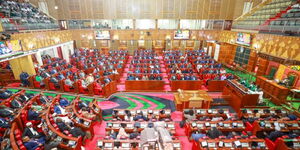A health crisis is threatening to bring Nairobi to its knees after health workers took to the streets to protest over unpaid salaries.
Directing their anger towards Governor Johnson Sakaja, the health workers held demonstrations for much of Thursday, October 2, demanding full payment of their salaries, spanning three months.
The health workers, who began their march at Jevanjee Gardens before camping at Sakaja’s City Hall offices, accused the governor of going against previous agreements on the payment of their salaries.
While downing their tools and heading to the streets, they claimed that Sakaja had turned a deaf ear to their demands, noting that he had not heeded any requests to address the salary arrears.
“We have not been paid our salaries for the last three months. The county loves signing agreements with us, but does not fulfil its promises. We are tired,” noted Malindi Chao, the KMPDU Secretary in Nairobi.
“We are getting excuses like the Exchequer has not sent money, or the money sent is not enough. We want to say that, as far as we are concerned, we do not know what the Exchequer, the CoG, and all these guys are. We want our salaries sent on time,” added Stephen Muthama, chair of KUCO Nairobi.
Their efforts to seek an address with Sakaja at City Hall failed as the governor was at the Kenya School of Government in Kabete attending a Jukwaa la Usalama security forum.
The strike is the second to be witnessed in Nairobi in recent weeks, after county government workers announced a go-slow on Wednesday, September 18, following salary delays.
Kenya County Government Workers Union (KCGWU), Nairobi branch Secretary Calvince Okello, in a memo, urged the workers to slow down or stay at home henceforth until their salaries and remittances are paid.
Okello noted that the county had defied a return-to-work agreement signed on August 11 in which the county had committed to paying salaries by the fifth day of each month.
However, as of September 17, the workers had yet to be paid, leading most of the county staff to fail to meet both their personal and family obligations.
As such, Okello claimed that many of the employees could not even afford the fare to commute to work and thus urged those unable to do so to boycott work until the payroll is fixed.












